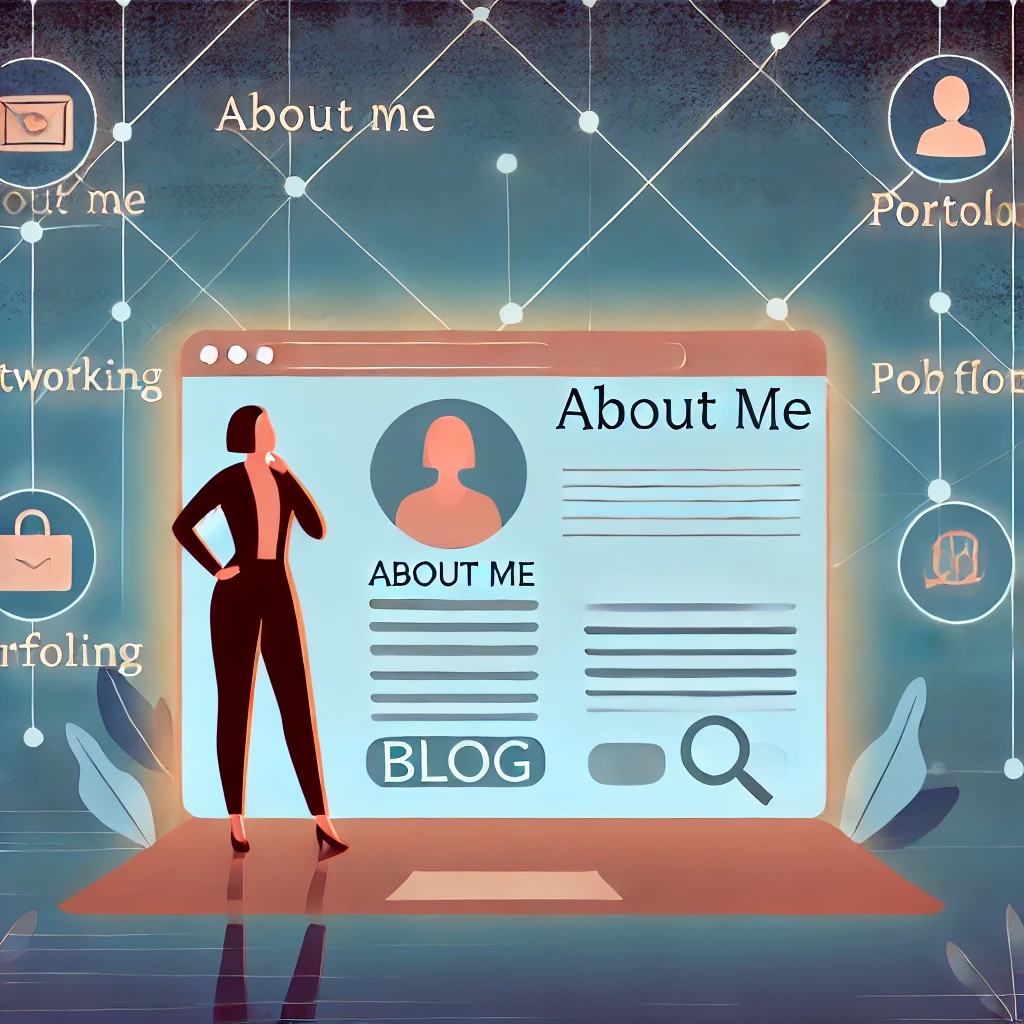Introduction to Digital Presence
In the 21st century having a digital presence is no longer a luxury, it is critical for personal and professional success. You need a personal website.
What is Your Digital Presence??
Digital presence is the sum of your online persona/brand, sometimes call a digital footprint. This includes everything from your Facebook, Instagram, X/Twitter, LinkedIn, SnapChat, YouTube, Tumblr, Pinterest, Podcasts, Blogs, Patreon, published articles, etc. It is how people know and find you.
In the 21st century, amidst growing globalization, artificial intelligence, remote work, knowledge work, etc, a strong digital presence can help you build a brand of credibility, trust, and differentiate yourself from others in a crowded online landscape.
Why do you need a website if you have all of these social media networks to have a profile on? I don’t suggest to abandon all of these other platforms in favour of a website. In fact I doubt many people would find your website without the social media platforms.
Having a personal website is the bedrock and central hub for your digital presence, where you can share your story, showcase your work, and connect with others in meaningful ways.
This helps establish credibility and flexibility online. Social media platforms have proprietary algorithms and policies that can change in a day, which can severely impact your visibility. You are also limited in the types of posts that you can make on any platform (photo vs video vs short tweets vs long articles, etc).

Unlike social media platforms your website is a stable foundation under your control. With a website, you can create content tailored to your audience’s needs and interests, showcasing your expertise and thought leadership in your field. This enables you to build relationships with readers and followers who are genuinely interested in what you have to say.
Ultimately, a personal website provides a central hub for your online presence, allowing you to establish credibility, build relationships with readers/followers, gain platform independence, and differentiate yourself from others. This is the key to digital empowerment in the 21st century – taking control of your online presence and building a strong foundation for success.
In fact, this website is MY personal website, and my first attempt at creating my own online central hub. You can learn more about me here.
Table of Contents
- Why You Need Your Own Website
- Distinguish Yourself In the Digital Age
- Personal Website Success Stories
- Conclusion: Take Control of Your Digital Presence
Why You Need Your Own Website
There are so many benefits to having your own website. I will explain the most important ones now. Think of a website like a digital asset, a digital business, or a digital property. Your own website is your own personal asset whose worth and profitability you directly control with how you build it out. You need your own website not just for marketing yourself, but as the business of you.
Control & Customization Over Your Own Digital Assets
Content Ownership
As I explained in the introduction: your account/profile and content created on other platforms is under the control and ownership of that specific platform. Where as the content that you create on your own website is owned by you.

Websites are Assets
Modern websites are often considered assets in their own right. Many are assets purely based off of the years of content that someone has created and/or curated. Some have actual businesses behind them, while others have huge followings that are not monetized, but who have the potential to be monetized.
Websites are Versatile
A website is also highly versatile and customizable. Not only can you share written, audio or visual content, but you can leverage digital tools, such as web-apps that can do things for your readers/followers such as:
- a financial calculator;
- mortgage calculator;
- an AI based chatbot that specializes in x, y, or z;
- web-app based games
- stock investment app
- diet tracking app
… there are hundreds of app ideas that can be integrated into your website, especially in the age of artificial intelligence.
Websites Scale
Websites also scale well, much better than real world businesses. If you owned a restaurant and your customer base increased 10x in 1-2 years you simply could not fit them all in the current restaurant.
You would need to expand: either lease/buy neighboring businesses, or purchase/lease another site for your restaurant. You would need to hire and train new staff and spend a lot of money. At best it would take months to scale, at worst, years.
With a website, your hosting provider can scale exponentially more easily and rapidly in response to increased website traffic. Depending on the scale you need, it will be available either instantly, or within a few days, maximum a few weeks (that would be massive scaling). With that scale comes increased revenues.
Central Hub of Your Online Life
Most of us have numerous social media profiles/accounts. The most common ones are:
- X (formerly Twitter)
Other common platforms where people have accounts include:
- Medium
- TikTok
- SnapChat
- GitHub
- Substack
- Patreon
- Tumblr
… there are dozens of others
Your website is the central hub of all of these profiles. Yes, you can cross-link your socials (post your Instgram or LinkedIn account on X, SnapChat, Facebook, etc). But the content does not get cross posted.
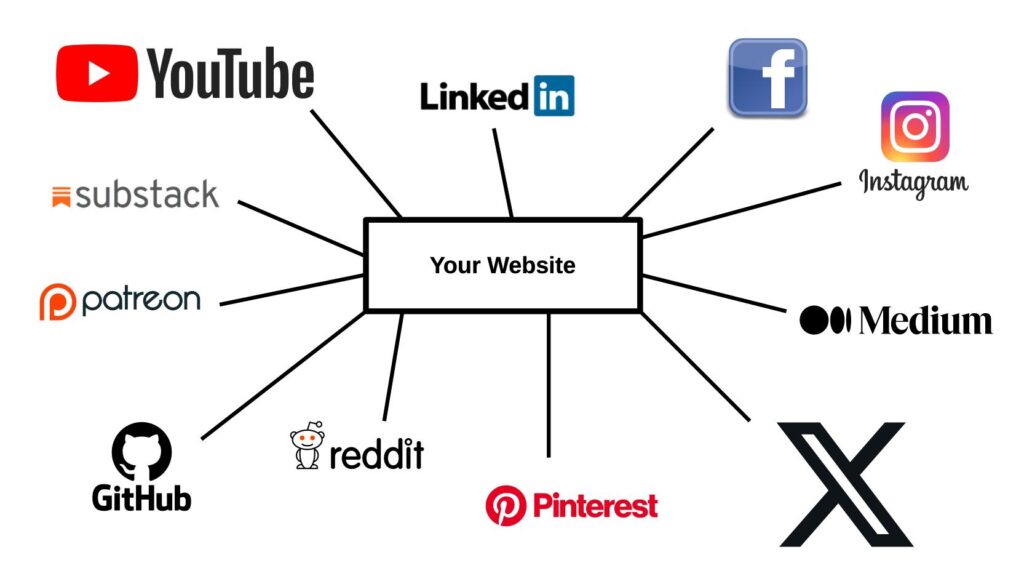
The home for your content should be your website. You can post a well researched article to your website, share the link with a summary on LinkedIn, create an X thread with the top 5 points in your article, share a screen shot of the article on Instagram with a link to the original and cross post the whole article to Medium. But the centre is your website.
Curate Email List – Direct Contact to Your Readers
So you’ve got 45,000 followers on Instagram, 22,000 on X, 2,000 Facebook friends, and an active Reddit and Medium account. Now you’ve shared new content. Not all of your followers will see it. Only a fraction will. If they’re not online the day you post, it will likely get pushed out of their feeds by more recent activity, even your more recent activity.
Other than DMs you cannot directly reach out to your followers.
When you have your own website it becomes easy to start collecting an email list. Once you build (an automated) directory of your followers’ emails you can directly reach out to them. If you lose access to a social media account, or are banned, or simply want to use it less, or are worried that your content might not make it in front of your audience – an email list is the solution.
This also means that you own your connection to your audience. As long as you have the email list, and you’ve built your personal brand, you can reach out to your audience for anything you like… without bombarding and annoying them of course.
Notify them when you:
- Publish a new book
- Write a great article you want to share
- Are launching a course they might be interested in
- To promote a product that you use and have affiliate links for
- Your daily, weekly, or monthly newsletter
- Reaching out for advice
- Share content with them in advance of anyone else
Earn Money
There are so many ways to earn money from your website. Many people earn more than a full time income from home (or anywhere) by creating content online. Your follower base/readership does not even need to be that large.
Paywall for Premium Content
You can create a paywall for premium content with website plugins, but you can also use a service that caters to this, such as:
- Substack
- Patreon
- FanFix
- … I’d be remiss not to include OnlyFans
… and others
Keep in mind that you do not even need a lot of paying subscribers.
5,000 subscribers paying $4.99/month is $24,950 USD/month. That is way more than most people make at their day jobs.

Create Courses
You have expertise or a passion project that you can share with others through online courses. For example, while I am a healthcare professional, I also have a passion for baking sourdough bread. You might create a course on healthy recipes, such as The Art of Making Amazing Homemade Sourdough Bread . Before investing time and effort in creating the course, research the market demand and competition to ensure there’s a need for your course.
Creating a course requires upfront effort, but it can be a lucrative way to monetize your expertise over the long term. You’ll earn passive income while focusing on other areas of your life once the course is created. This means you can enjoy financial stability without having to constantly work on new content.
To illustrate this potential, let’s consider an example. As an accountant, you might create a course on Easy Tax Preparation and sell it for $20. If you reach 2,000 customers over the year, that’s a potential revenue stream of $40,000. By creating high-quality courses like this one, you can build a sustainable income stream.
eCommerce Store
If you’re passionate about creating digital products or physical goods, consider attaching an eCommerce store to your personal website. With the numerous plug-and-play options available today (think Shopify, BigCommerce, or Wix), setting up an online store has never been easier.
As a creative professional, such as a photographer or influencer, you can monetize your expertise by selling premium products directly to your audience. For instance:
- Photographers can sell high-resolution images, prints, or even offer customized photo services.
- Influencers can design and sell branded merchandise like T-shirts, hats, mugs, or phone cases featuring their unique designs or catchphrases.
These plug-and-play eCommerce solutions make it simple to outsource the production and shipping of physical products, while you focus on creating engaging content and promoting your brand. By leveraging your website as a store, you can increase revenue streams, build customer loyalty, and establish yourself as a trusted authority in your niche.
eBook
Self publishing eBooks was all the rage in the 2010s – but make no mistake, while the market is more saturated, you can still make a lot of money doing this.
Freelance
As a freelancer, your website is an essential marketing tool that showcases your work, skills, and services to potential clients. By sharing client reviews and testimonials on your website, you can build credibility and trust with prospective clients, increasing the likelihood of securing new projects and building a strong reputation in your industry.
A well-designed portfolio page can also help you differentiate yourself from competitors and establish your expertise in specific areas, making it easier to attract high-paying clients who value your skills.
Nowadays, you don’t even need PayPal or eTransfer to accept payment – you can accept payment from anyone globally with bitcoin or USDT/USDC.

Digital Portfolio & Resume
A digital portfolio and resume are essential for establishing credibility and building trust in the eyes of potential clients or employers. By showcasing your skills, experience, and achievements on your website, you can demonstrate expertise and build confidence in your professional abilities.
Whether you’re a writer, photographer, accountant, or contractor, having a well-curated digital portfolio can help you stand out from others and establish yourself as a thought leader in your industry. By sharing relevant content, such as published work, client reviews, or blog posts, you can showcase your expertise and build trust with those who matter most – potential clients, employers, and partners.
Professional Email
When you own your website, you can create custom domain emails (e.g. YourName@YourWebsite.com) with many services offering free options. This boosts your professionalism and shows others that you’re serious about your work.
You can also create email addresses for team members or partners using the same domain, making it easy to manage multiple contacts from a single email address.
Express Your Creativity & Share Your Interests
You have the freedom to turn your website into a vibrant canvas that showcases your personality and creativity. Whether you want to share your professional work or indulge in your passions, a separate section on your site can cater to your creative side. Share your love for pop culture, explore an intellectual niche interest like sustainable greenhouse winter heating for small homesteads, or express yourself through any other topic that sparks your enthusiasm.
As the creator of your website, you take center stage and bring your vision to life with every design element: theme, color scheme, photos, button design, and more. Your creativity shines bright in the content you produce, share, and post, giving visitors a glimpse into your unique perspective and interests.

Through your website, you can curate a community of like-minded individuals who share your passions and interests. As you explore topics that matter to you, your audience will be inspired by your expertise, enthusiasm, and creativity, fostering meaningful connections and sparking new conversations.
Distinguish Yourself In the Digital Age
Standing Out in a Crowded Online Space
In today’s digital age, it’s easy to get lost in the noise. Everyone has a LinkedIn profile, Instagram account, and a presence on most social media platforms. But with so many people competing for attention online, how do you differentiate yourself from the crowd? The answer lies in creating a unique and authentic online presence that showcases your personality, skills, and expertise.

The Power of a Personal Website
Having a personal website is one way to stand out from the competition. Unlike LinkedIn profiles or social media accounts, which often have strict character limits and formatting restrictions, a website gives you the freedom to express yourself fully. You can share long-form content about your accomplishments, education, experiences, and projects, providing a more comprehensive view of who you are and what you do. Additionally, you can host podcast content, photo and video content, and other types of media that showcase your creativity and expertise.
Taking Control of Your Digital Presence
When you have a personal website, you’re not just creating a static online profile – you’re curating a dynamic digital presence that reflects who you are and what you do. By hosting all of your social media profiles and accounts on one platform, you make it easy for others to find and connect with you across multiple channels. This helps to build trust and credibility with your network, and can even lead to new opportunities and collaborations. So why settle for a generic LinkedIn profile or social media account when you can create a unique and engaging personal website that showcases your personality and expertise?
Personal Website Success Stories
There are so many people with personal websites out there that it was hard to choose some examples. Here are some screenshots and links to the respective websites.
Isaac Chung – Machine Learning / AI Industry
www.isaac-chung.github.io
In his own words, from his own website:
“My background is in Aerospace Engineering and Machine Learning and I hold undergraduate (B.A.Sc in EngSci) and graduate (M.A.Sc) degrees from the University of Toronto.
I work remotely in Europe, currently based in Tallinn, Estonia. In my spare time, I try to contribute to open source projects (e.g. MTEB), see the world, and do a bit of swim/bike/run racing.”
Isaac posts about his passion for AI and LLMs, his past and ongoing projects, his contributions to open source projects, conferences, talks, papers that he has written/published, and he also has a blog where he writes about his passion: Artificial Intelligence.
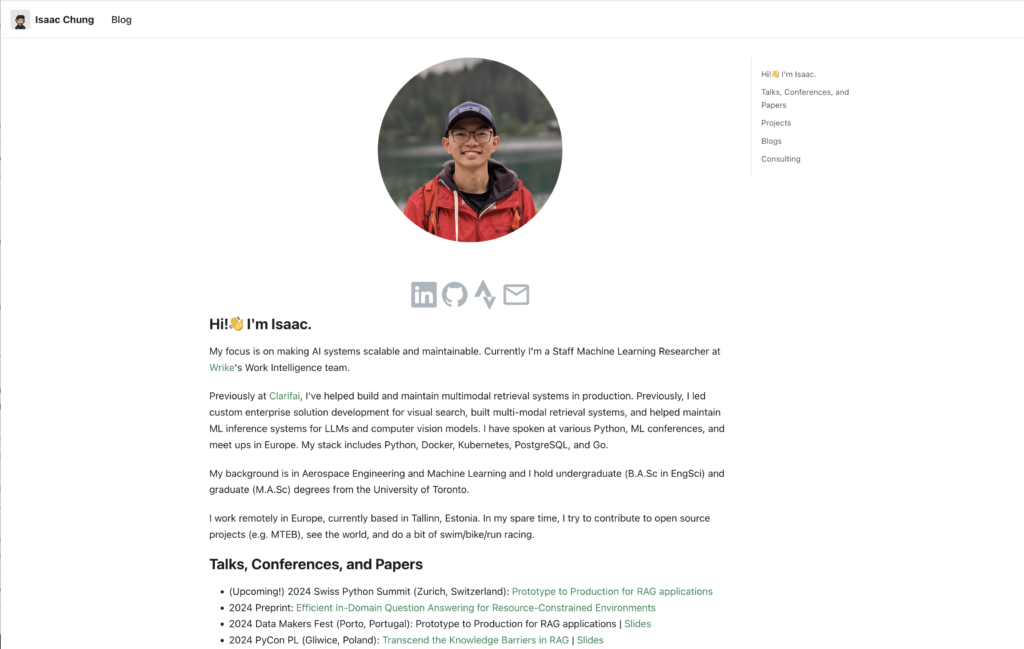
Lex Fridman – Podcaster, Engineer
Lex started out as a Computer Scientist, worked for Google in 2014 and moved to work at MIT in 2015 as a researcher and professor. He started his podcast in 2018 and rose to fame quickly due to his long form, deep, intellectually stimulating conversations that often run 3-4 hours long.
He does not simply rely on social media, he built a website to host his content and serve as a hub for his work.
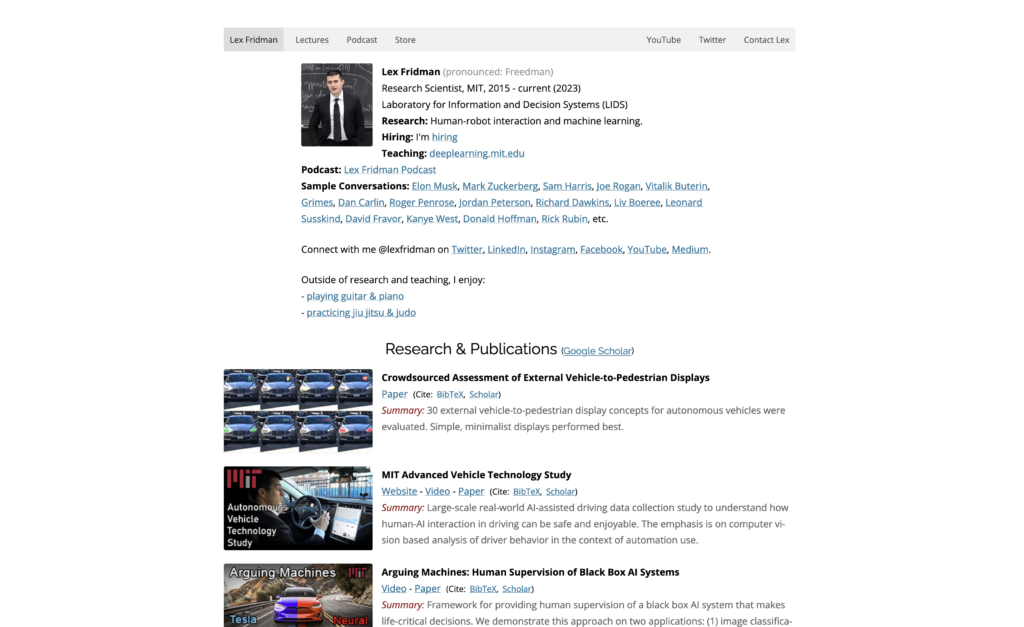
Gabriel Iglesias – Comedian
A comedian who has a large social media presence, but he also has his own website where you can find all of his work, information on his past and upcoming live shows, merchandise from his eCommerce page (shop), news, and about me page.
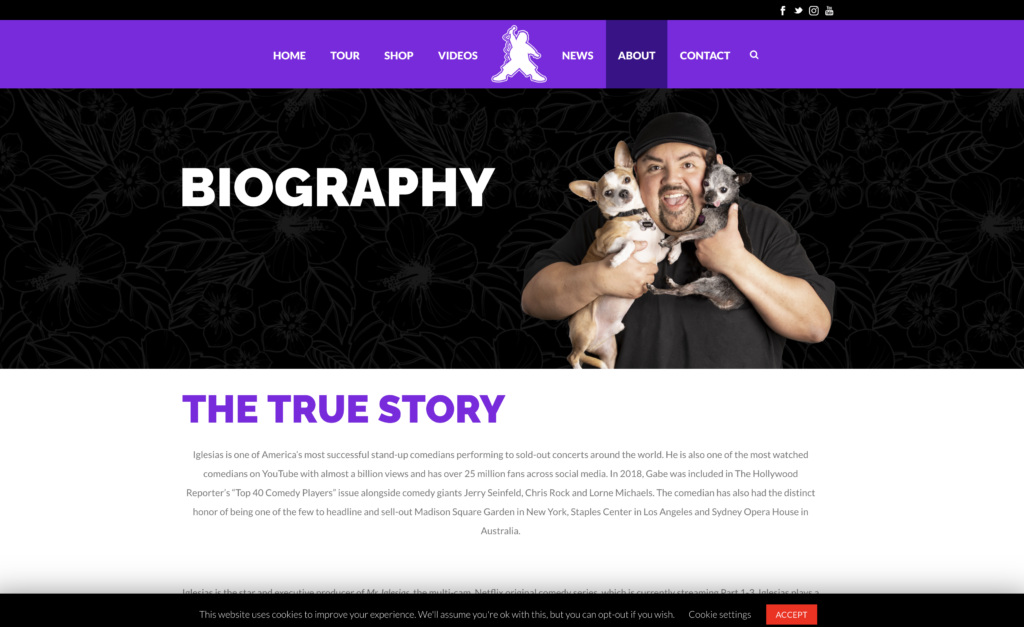
Markus Potter
www.markuspotter.com
A theatre director and Associate Professor at the University of Kansas. In his About Me page he talks about his very culturally diverse family, his life mission, and personal bio. His website displays his work, projects, reviews/news, etc. He can post whatever he likes on his website.
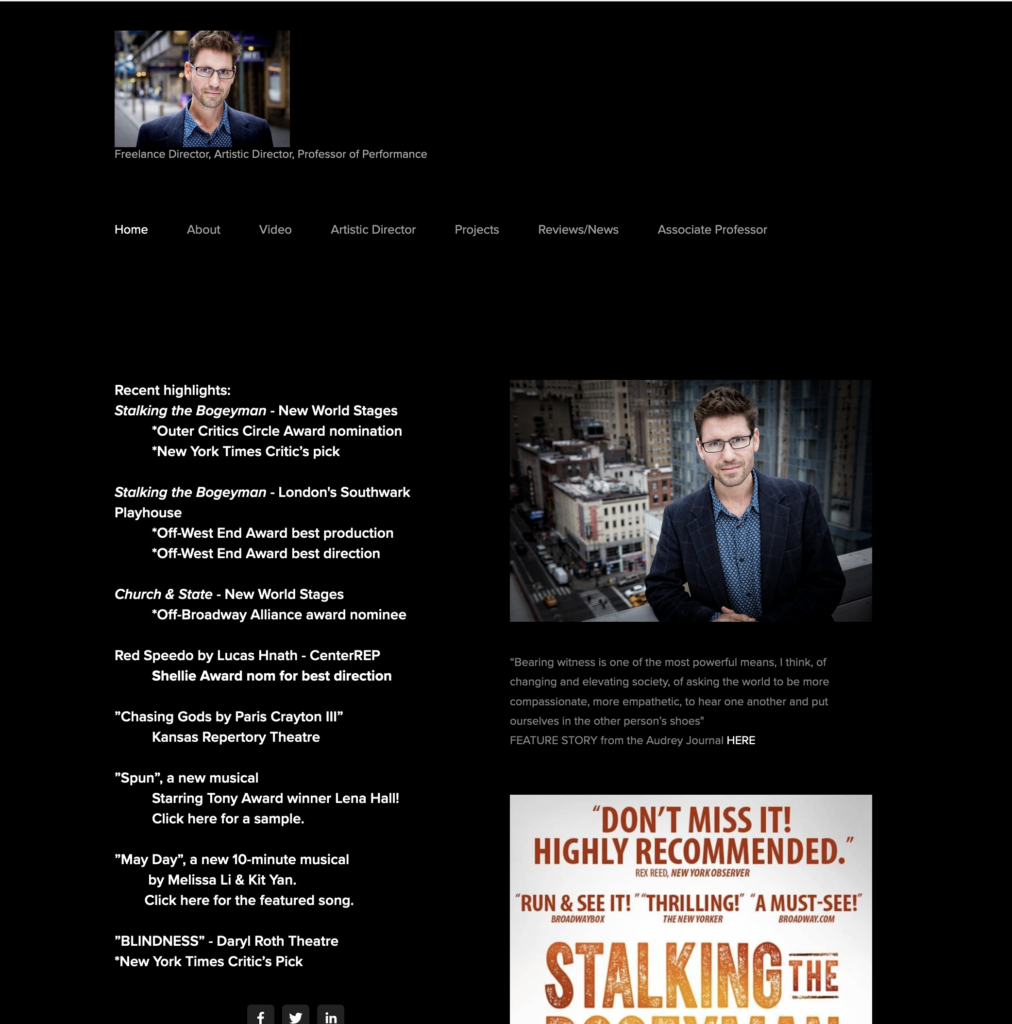
Conclusion: Take Control of Your Digital Presence
Making a website is easy to do in the 21st century! There are so many drag and drop options, free and paid website themes that have varying level of customization.
By creating a personal website, you’re taking the first step towards building a strong online presence that reflects your personality, skills, and expertise. You’re not just sharing information with others – you’re curating a dynamic digital platform that showcases who you are and what you do.
Take Action: Create Your Personal Website Today!
Don’t let social media platforms control your online narrative. Take control of your digital presence by creating a personal website that reflects your unique voice, skills, and passions. With a website, you can share your story, showcase your expertise, and connect with others who matter most.
Get Started Now:
- Sign up for a domain name and web hosting service
- Choose a website builder or content management system (CMS) that suits your needs
- Design and build your website using your own creativity and flair
- Share it with the world and start building your online presence today!
Remember, your personal website is your digital home on the internet. It’s time to take control of your online presence and show the world who you are!
